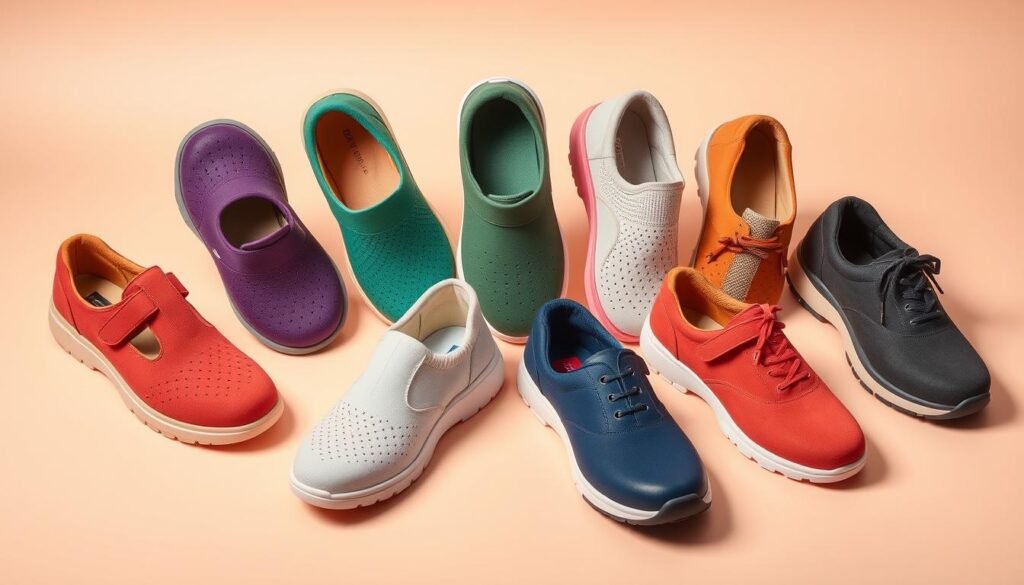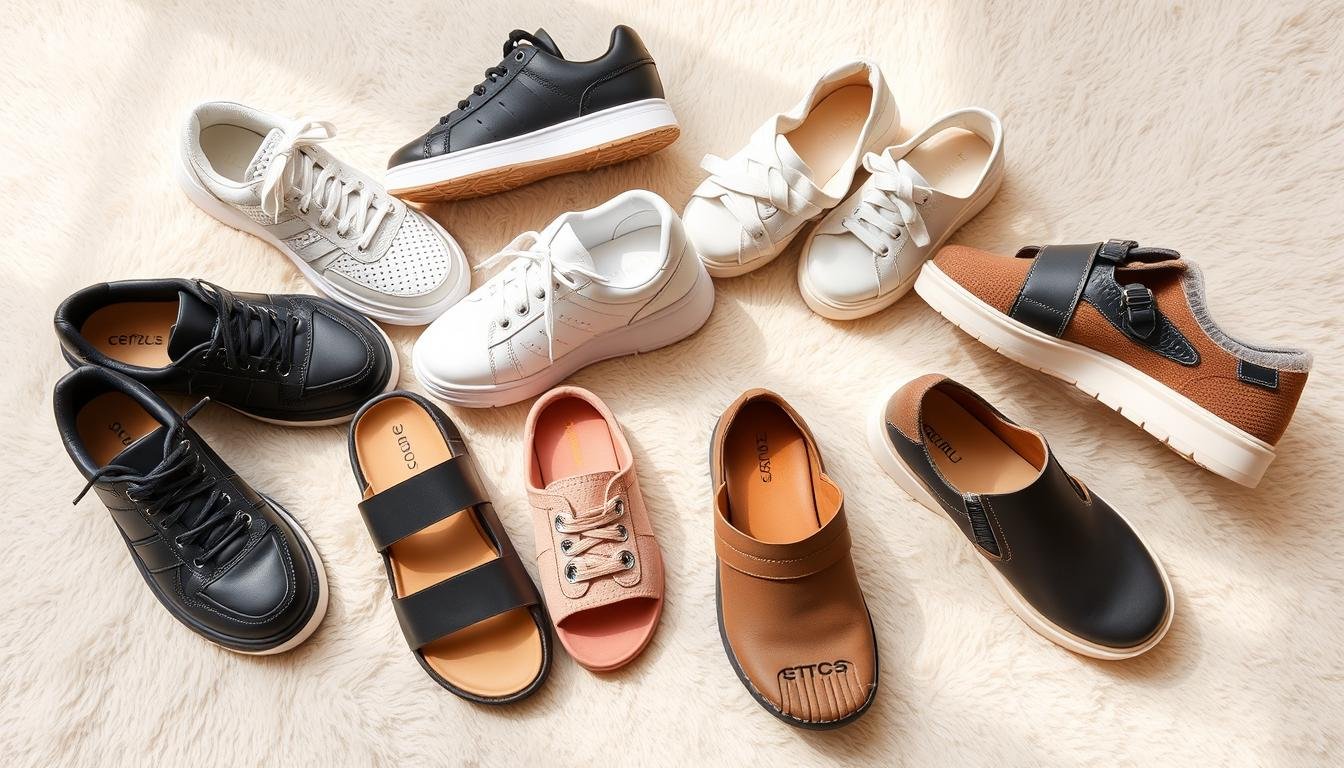Healthy feet are key to your overall well-being. Orthopedic shoes can help with foot issues and comfort.
These special shoes give support, stability, and cushioning. They can ease foot problems and boost foot health.
This guide will explain orthopedic shoes and their benefits. We’ll cover signs you might need them and key features to look for.
We’ll also highlight top brands of orthopedic footwear. This info will help you choose the best shoes for your feet.
What Are Orthopedic Shoes?
Orthopedic shoes are special footwear for good foot health benefits. They help people with foot problems like flat feet or high arches.
The main goal of orthopedic footwear is to ease pain and improve posture. These shoes make walking more comfortable for many people.
Orthopedic shoes use strong and comfy shoe materials. They have breathable fabrics and supportive soles.
These shoes give a stable base for your feet. They help reduce strain on feet, ankles, and legs.
Good orthopedic shoes can help you stay active without pain. They address the causes of foot problems.
Buying quality orthopedic shoes can greatly improve your daily comfort. They’re a smart choice for better foot health.
Signs You Need Orthopedic Shoes
Foot pain that won’t go away? Swollen feet or ankles? You might need orthopedic shoes. These special shoes help with many foot problems.
Constant foot pain is a big clue. It can be sharp or dull. Your shoes may not be giving enough support.
Swollen feet or ankles? That’s another sign. Orthopedic shoes can help with this too.
Some foot shapes need special care. Bunions, hammertoes, or flat feet? Orthopedic shoes can help.
These shoes fit your feet’s unique needs. They can ease pain and stop more problems.
Talk to a foot doctor if you have these issues. They can help you find the right shoes.
Good orthopedic shoes can change your life. Say goodbye to foot pain. Enjoy moving around more easily.
Features to Look for in the Best Orthopedic Shoes
Orthopedic shoes need key features for comfort. Proper arch support keeps feet aligned and prevents issues like plantar fasciitis.
Good cushioning absorbs shock and reduces joint stress. Breathable materials like leather or mesh keep feet cool all day.
These shoes offer superior comfort for your feet’s needs. They have sturdy, flexible soles that allow natural foot movement.
A roomy toe box lets toes spread out naturally. Choosing shoes with these features keeps feet healthy.
The right orthopedic shoes can boost your well-being. Invest in a pair that fits your needs for best results.
Top Brands for Orthopedic Shoes
New Balance, ASICS, and Vionic lead in comfortable, supportive footwear. These brands create orthopedic shoes that blend style and function.
New Balance is known for quality and innovation. Their shoes have ABZORB cushioning and roll bars for support.
ASICS makes athletic-inspired orthopedic shoes. The GEL-Kayano model combines biomechanics with a sporty look.
Vionic offers fashionable and functional orthopedic shoes. They have podiatrist-approved features like adjustable straps and contoured footbeds.
Vionic shoes promote proper foot alignment. They help with issues like plantar fasciitis.
These brands offer options for everyday wear and athletics. You’ll find something to suit your needs.
Types of Orthopedic Shoes Available
Orthopedic shoes come in many types to fit different needs. They help people with foot problems stay comfy and active.
Athletic orthopedic shoes give great support for workouts. They use special tech to keep feet safe during sports.
Casual orthopedic shoes mix style and comfort. They ease foot pain while looking good for everyday wear.
Orthopedic dress shoes look professional and feel comfy. They’re perfect for long days at the office.
There are many choices in orthopedic shoes today. You can find the right pair to keep your feet healthy.
How to Choose the Right Size
Picking the right shoe size is key for comfy orthopedic shoes. Measure your feet in the evening when they’re biggest.
Stand on paper and trace your foot. Measure from heel to longest toe. Check the brand’s size chart.
A good fit is vital for foot support. Shoes should be snug but not tight.
Your toes need room to move. Avoid loose shoes or ones that pinch.
Take time to find the right size. You’ll get the most from your orthopedic shoes.
Care and Maintenance of Orthopedic Shoes
Regular shoe care keeps your orthopedic footwear effective. Clean and store them properly to maintain foot health.
Clean your shoes often with a damp cloth. Focus on the insoles to prevent moisture and bacteria buildup.
Check for worn treads or damaged support features. Replace shoes when needed for best foot support.
Store shoes in a cool, dry place away from sunlight. This prevents material damage over time.
Use shoe trees or stuff toes with paper. This helps maintain the shoe’s shape when not worn.
These tips will keep your shoes supportive and comfy. Your feet will thank you for the care!
Customer Reviews: Real Experiences
Customer feedback and expert tips are key for finding top orthopedic shoes. Let’s look at real experiences from people who’ve tried these special shoes.
One happy customer said, “These shoes changed my life. The arch support is amazing. I can now walk without pain.”
Another user praised their shoes’ long-lasting quality. “After a year, they still look and feel new. The quality is impressive.”

Dr. Sarah Thompson, a top podiatrist, offers expert advice. “Look for strong heel support, flexible soles, and good cushioning in orthopedic shoes.”
She adds, “These features help keep feet aligned and lower injury risk.”
These reviews can guide you to the best orthopedic shoes. They’re great for foot pain, health, or just comfy, reliable footwear.
Where to Buy the Best Orthopedic Shoes
Finding perfect orthopedic shoes is easy with many options available. Online stores like Amazon, Zappos, and Orthofeet offer a wide range of footwear.
These websites provide detailed product info, reviews, and size guides. You can compare styles and brands from home.
Specialty stores like Foot Solutions offer personalized shopping experiences. They have trained staff to assess your foot needs.
These professionals can recommend the best shoes for you. They also provide fitting services for comfort and support.
Your podiatrist can give expert advice on orthopedic shoes. They consider your medical history and foot conditions.
With their guidance, you’ll find shoes that support your feet well. You can be sure you’re getting the right footwear.
FAQ
What are orthopedic shoes?
Orthopedic shoes are special footwear that give extra support and comfort. They help with foot problems and make walking easier.
These shoes reduce pain and keep feet healthy.
How do I know if I need orthopedic shoes?
You might need orthopedic shoes if your feet hurt a lot. Swollen feet or ankles are also signs.
Ask a foot doctor if you have these issues.
What features should I look for in the best orthopedic shoes?
Good orthopedic shoes have strong arch support and soft cushions. They use materials that let your feet breathe.
These features work together to keep your feet comfy.
What are some top brands for orthopedic shoes?
New Balance, ASICS, and Vionic are well-known orthopedic shoe brands. They make good shoes for different foot needs.
What types of orthopedic shoes are available?
There are many types of orthopedic shoes. You can find sporty, casual, and fancy ones.
This variety helps you pick shoes that fit your life.
How do I ensure I choose the right size for my orthopedic shoes?
To get the right size, measure your feet carefully. Try shoes on in the evening.
Ask a shoe expert to help you find the perfect fit.
How do I care for and maintain my orthopedic shoes?
Clean your orthopedic shoes often to make them last longer. Look for signs of wear.
Store them properly to keep their shape and support.
Where can I find customer reviews and expert recommendations for the best orthopedic shoes?
Look for reviews on shoe websites and online forums. Foot doctors can also give good advice.
These sources help you learn about different orthopedic shoe models.
Where can I purchase high-quality orthopedic shoes?
Buy good orthopedic shoes from trusted online stores or special shoe shops. Your doctor can suggest places based on your needs.



